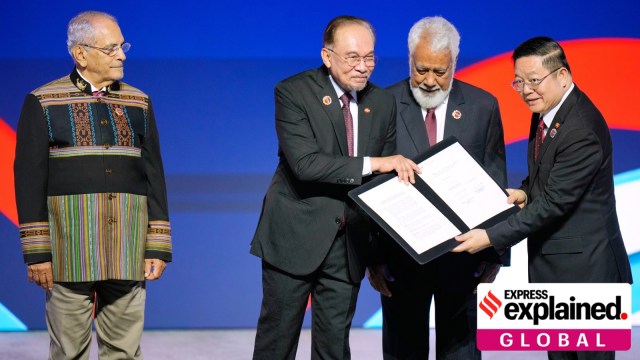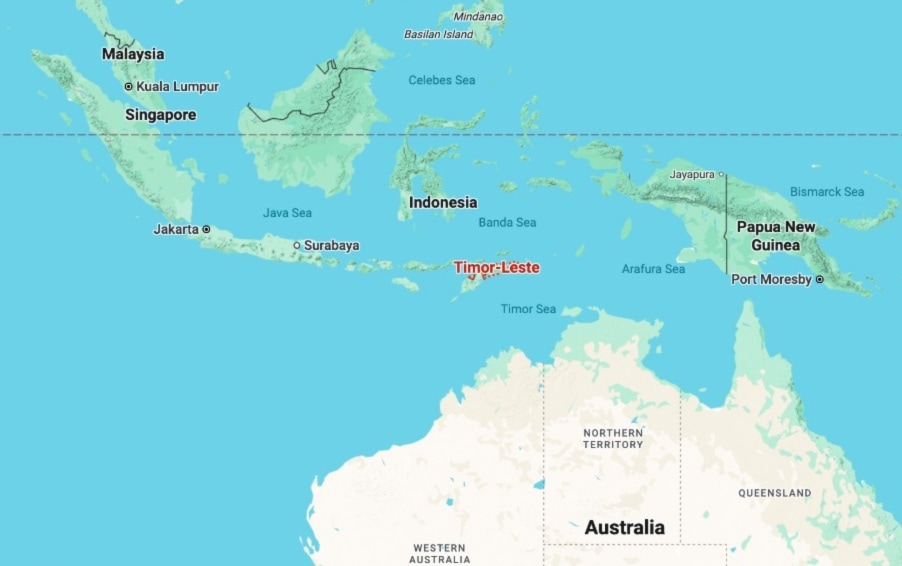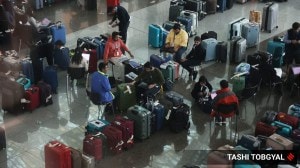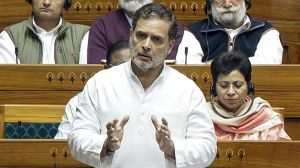Asia’s youngest nation joins ASEAN: 3 things to know about East Timor
East Timor ASEAN New Member: Also known as Timor-Leste, the nation has a recent history of colonisation by Portugal and Indonesia, with some US assistance. Where does it stand today, and why has it joined ASEAN now?
 (L to R) East Timor President Jose Ramos-Horta, Malaysia's Prime Minister Anwar Ibrahim, East Timor PM Kay Rala Xanana Gusmao, and China's Premier Li Qiang at the signing ceremony to admit East Timor into ASEAN in Kuala Lumpur, Malaysia, Oct. 26. (AP Photo/Vincent Thian)
(L to R) East Timor President Jose Ramos-Horta, Malaysia's Prime Minister Anwar Ibrahim, East Timor PM Kay Rala Xanana Gusmao, and China's Premier Li Qiang at the signing ceremony to admit East Timor into ASEAN in Kuala Lumpur, Malaysia, Oct. 26. (AP Photo/Vincent Thian)East Timor 11th Member of ASEAN: The 10-member Association of Southeast Asian Nations (ASEAN) welcomed East Timor as its newest member on Sunday (October 26), at its ongoing summit in the Malaysian capital of Kuala Lumpur.
Established in 1967, ASEAN has engaged with countries such as the United States, China and India over the years, and US President Donald Trump attended the summit on Sunday. Prime Minister Narendra Modi addressed the leaders virtually, welcoming East Timor and saying that India and ASEAN shared not only geographies but also deep historical relationships, alongside shared values.
East Timor, also known as Timor-Leste, had long attempted to join ASEAN, given the organisation’s significance in maintaining economic, political and security coordination in the region. East Timor Prime Minister Xanana Gusmao said, “For the people of Timor Leste this is not only a dream realised, but a powerful affirmation of our journey — one marked by resilience, determination and hope.”
It also marked ASEAN’s first expansion in years, after Cambodia last joined it in 1999. Here is what to know about the country, its admission, and why ASEAN matters to it.
1. East Timor became independent in 2002
With a population of 1.4 million, East Timor is located in the Pacific Ocean to the north of Australia. It constitutes the eastern side of a larger island, while most of the western side is under Indonesian control. East Timor was a Portuguese colony for over four centuries before it gained independence in 1975, but was invaded by Indonesia just nine days later.
 East Timor. (Google maps screenshot)
East Timor. (Google maps screenshot)
According to the book ASEAN Resistance to Sovereignty Violation, written by author Laura Southgate, that invasion was a result of expansionist tendencies on Indonesia’s part, and concerns about the spread of Communism in the region amid the Cold War. President Suharto was anti-Communist and was often supported by the United States.
Then US Secretary of State Henry Kissinger stated that “In the post-Vietnam environment, US interests in Indonesia are based both on its present position in the region and, especially, on its anticipated future role… its geographic location and resources are of major strategic importance in the region”.
On East Timor, he said, “Jakarta has become concerned that the backward and resource-poor colony would attain what the Indonesians expect would be a weak, unviable independence leaving it susceptible to outside – especially Chinese – domination… a merger with Indonesia is probably the best solution for the colony if the inhabitants agree”.
After Indonesia got some East Timor parties to agree to integration with the country, they launched an invasion, but not without resistance. The invasion resulted in the deaths of thousands, and the occupation only ended with a United Nations-supervised referendum in 1999. Following an outbreak of violence, real independence only came in 2002.
2. East Timor is led by a Nobel Peace Prize winner
Current President Jose Ramos-Horta, 75, won the Nobel Peace Prize in 1996. He was jointly awarded with Catholic priest and fellow East Timorese Carlos Filipe Ximenes Belo, “for their work towards a just and peaceful solution to the conflict in East Timor”.
Ramos-Horta was described on the Nobel website as one of the people who set up the liberation movement FRETELIN (Revolutionary Front for an Independent East Timor). For twenty years, he travelled all over the world, “pleading the cause of the East Timorese, above all in the United Nations”. The bishop similarly called on the international community and the UN.
3. ASEAN membership matters, especially given East Timor’s economic situation
According to the Associated Press, “Some 42% of the country’s population live below the national poverty line. Nearly two-thirds of its citizens are under 30 years old, making youth job creation a high priority. Its major source of government revenues comes from the oil and gas industry, but with resources quickly becoming depleted, it is looking to diversify.”
It is somewhat of an anomaly in economic terms, compared to the rest of the more prosperous ASEAN, which includes Brunei, Cambodia, Indonesia, Laos, Malaysia, Myanmar, the Philippines, Singapore, Thailand, and Vietnam. Altogether, the grouping represents more than 680 million people and a total GDP of $3.8 trillion. Malaysian Prime Minister Anwar Ibrahim said East Timor’s accession “completes the ASEAN family, the affirming of our shared destiny and deep sense of regional kinship.”
ASEAN was formed a few years before East Timor gained independence from Portugal. Since then, it has been held up as one of the more successful international organisations, despite challenges that usually accompany expanding groupings, featuring a range of nations with varying goals.
A report in The Diplomat recently said that East Timor had signed many agreements with ASEAN over the years. With full membership, it will become part of major regional institutions, such as the 15-member free trade pact, the Regional Comprehensive Economic Partnership (RCEP).
“The governing elite is well aware of the burdens involved and the unpredictability of factors such as a weak and underperforming bureaucracy… excessive economic dependence on oil extraction, and the lowest per capita GDP in the region. Cautiously, Timor-Leste’s President Jose Ramos-Horta has acknowledged that full capacity-building will be a long-term process,” it said.
- 01
- 02
- 03
- 04
- 05






































